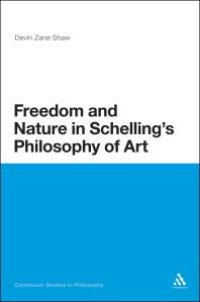
Ebook: Freedom and Nature in Schelling's Philosophy of Art
Author: Devin Zane Shaw
- Tags: Schelling Friedrich Wilhelm Joseph von -- 1775-1854., Art -- Philosophy.
- Series: Continuum Studies in Philosophy Ser.
- Year: 2012
- Publisher: Bloomsbury Publishing Plc
- City: London, United Kingdom
- Edition: 1
- Language: English
- pdf
Schelling is often thought to be a protean thinker whose work is difficult to approach or interpret. Devin Zane Shaw shows that the philosophy of art is the guiding thread to understanding Schelling's philosophical development from his early works in 1795-1796 through his theological turn in 1809-1810. Schelling's philosophy of art is the 'keystone' of the system; it unifies his idea of freedom and his philosophy of nature. Schelling's idea of freedom is developed through a critique of the formalism of Kant's and Fichte's practical philosophies, and his nature-philosophy is developed to show how subjectivity and objectivity emerge from a common source in nature. The philosophy of art plays a dual role in the system. First, Schelling argues that artistic activity produces through the artwork a sensible realization of the ideas of philosophy. Second, he argues that artistic production creates the possibility of a new mythology that can overcome the socio-political divisions that structure the relationships between individuals and society. Shaw's careful analysis shows how art, for Schelling, is the highest expression of human freedom.
Download the book Freedom and Nature in Schelling's Philosophy of Art for free or read online
Continue reading on any device:

Last viewed books
Related books
{related-news}
Comments (0)